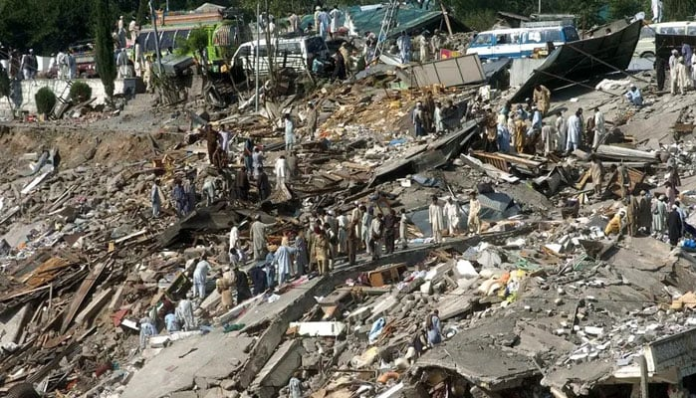ISLAMABAD, OCT 8 (DNA) : President Asif Ali Zardari and Prime Minister Shehbaz Sharif on Tuesday marked the 19th anniversary of the devastating 2005 earthquake, that killed thousands in northeast Pakistan.
In their tributes to the victims of the deadly earthquake, President Zardari called for the construction of climate-resilient infrastructure while PM Shehbaz urged for efficient coordination and development of contingency plans to mitigate the impacts of climate change.
The premiers’ remarks came as the nation marked the ‘National Resilience Day’ in several parts of Azad Jammu and Kashmir (AJK) and Khyber Pakhtunkhwa (KP).
This day is commemorated annually in Pakistan on October 8, in memory of the victims of the deadly 7.6 magnitude earthquake that claimed the lives of over 87,000 people in AJK and KP on the same date in 2005.
‘Looming climate change threat to Pakistan’
In his message to the nation, Zardari stressed the need to educate the people about disaster risk management, and mitigation, and actively engage the communities to promote a culture of disaster preparedness.
“We need to equip our relevant institutions with the latest technologies, expertise, and resources to effectively respond to emerging challenges,” said Zardari.
The 69-year-old leader of the Pakistan Peoples Party (PPP) also extended his deepest gratitude to the international community, friendly countries, civil society, welfare and charity organisations that extended support in the aftermath of this earthquake.
Their support and solidarity not only helped us rebuild our roads, education, health and other infrastructure but also gave hope to the affected people, enabling them to rebuild their lives, he said.
Additionally, he said that the looming threat of climate change in recent years has made Pakistan more vulnerable to natural disasters.
He highlighted that rising temperatures, unpredictable weather patterns, and extreme weather events such as floods, droughts, heatwaves, and landslides posed a potential threat to the country’s infrastructure and its people.
Furthermore, he added that it had become “essential to invest in the capacity building of our national and provincial disaster management authorities and enhance their disaster preparedness”.
He stressed that improving early warning systems, enhancing coordination among national and provincial authorities, and adopting modern disaster mitigation strategies should be the key priorities to timely respond to threats.
‘Pakistan facing immense impact of climate change’
Prime Minister Shehbaz Sharif said that efficient and effective risk communication to farthest communities was critical for national resilience.
“‘National Resilience Day’is a motivation for us to embrace the best practices and implement policies and strategies aimed at fortifying our nation’s resilience,” the PM said in his message.
He said the government’s policy initiatives should encompass various sectors, including safe development of infrastructure, improved disaster preparedness, poverty alleviation, safer spatial land use planning, adherence to building codes, efficient water resource management, sound agricultural practices, and increased afforestation nationwide, including coastal areas.
“The 8th of October reminds us of the devastating earthquake of 2005 – a great tragedy that befell upon Pakistan and Azad Jammu and Kashmir. Our heartfelt prayers go to all those who endured loss of lives and properties,” he added.
“After the devastating 2005 earthquake, the floods of 2022 were a mega disaster surpassing all past records,” he said adding that the people and institutions of Pakistan had always shown immense resolve and demonstrated ability to resurface amidst catastrophes and national crises, induced by climate change and environmental hazards.
He said Pakistan was facing an immense impact of climate change “despite not being responsible for it”.
Frequent recurrence of unpredictable extreme events has given devastating blow to our struggling economy, he said.
He also commended the National Disaster Management Authority (NDMA) of Pakistan for its hard work to have evolved a tested mechanism as a national response towards such natural calamities.
He expressed his satisfaction that NDMA’s National Emergencies Operation Center (NEOC) had the best capacities in management of national disasters.
The 73-year-old premier urged all stakeholders to seek synergy through greater and refined understanding of each other’s strengths and capacity limitations, achieving maximised interoperability amongst local, zonal, national, global, and public and private sectors through a ‘whole of society’ approach.
On this occasion, he also expressed the gratitude for the valuable help provided by the international community, civil society, and private philanthropy in bolstering the government’s national response efforts during the 2022 floods disaster.

















